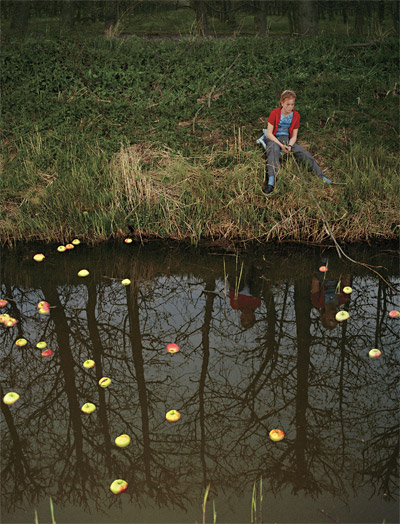When I was a child, I was told many times, “Be patient” or “Patience is a virtue.” I would relate to these words in much the same way I would to the order “Eat your spinach.” To me, “Be patient” meant “Grin and bear it,” or that I should repress my feelings about the disagreeable aspects of life. This is not what is meant by patience from the Buddhist perspective, however.
Patience, or khanti, is the sixth of the ten perfections, or paramis (the virtues that one has to perfect in order to fully awaken; there are ten paramis in the Theravada tradition, six paramitas in the Mahayana). The clarity of wisdom and the softness of compassion are the companions of each of the perfections. Patience is motivated by our desire for inward and outward peace and by faith in our ability to accept things as they are. In Buddhism patience has three essential aspects: gentle forbearance, calm endurance of hardship, and acceptance of the truth.
Gentle Forbearance
The first aspect of patience is gentle forbearance. We may be the exhausted parent of a child who is having a fit over some baffling homework; perhaps patience in this case means taking a few deep breaths instead of yelling in frustration. Or we may be on the verge of making a brilliant retort to a coworker, but we hold our tongue rather than say something hurtful. Even though our impatience is triggered, we can tap into the deeper reservoir of our motivation not to do harm. Gentle forbearance may feel difficult—even contrived—because it doesn’t constitute true acceptance of how things are. But it is nonetheless a critical aspect of patience because it helps us restrain ourselves long enough to determine the most skillful action for the moment.
Impatient thoughts come and go by themselves, just as the breath comes and goes by itself.
Gentle forbearance helps to anchor our attention in the movement of the breath. Can we truly receive just one breath? Can we sustain the attention from the birth of the breath, through its life, and through its passing away? We notice that in these moments of attention we are temporarily freed from mental torment. There is no need to focus on our expectations or attachment to results. Impatient thoughts come and go by themselves, just as the breath comes and goes by itself.
Any time we want life to be different than it is, we are caught in impatience. We lose our sense of humor; and self-pity, despair, and blame seep into the heart. Gentle forbearance includes the spirit of forgiveness. When we feel conflict with others, understanding their suffering is the first step in being able to communicate, forgive, and begin again. The practice of forgiveness happens when we are able to realize the underlying cause of our anger and impatience, and this allows us to distinguish between someone’s unskillful behavior and essential goodness. Serenity and calm develop as we learn to accept imperfection in others and ourselves.
Endurance of Hardship
The second aspect of patience is the calm endurance of hardship. The Buddha said that the world rests on suffering. But endurance of suffering doesn’t mean doing nothing to alleviate it. Patience isn’t passive; it’s motivated by an acceptance of and compassion for suffering rather than a desire to eradicate it. When we feel impatient with our relationships, our work, or our spiritual practice, we need to realize that we are resisting how things are. A sense of humor and curiosity about our lives can also help us confront impatience.
My five-year-old niece complained to me recently, “I hate school.” I replied, “Oh, that’s too bad. Why?” “Because it’s so boring,” she said. She loves the movie Finding Nemo, so I reminded her how Dory and Nemo’s father, Marlin, endured the obstacles on their long journey to liberate Nemo. I asked, “What did Dory say to Marlin when they were lost and ready to give up?” She remembered “When life gets you down, just keep swimming.” She laughed, and she became interested in exploring why she gets bored in school. I challenged her to tell me one interesting thing that is happening every time she thinks she’s bored. Through investigating boredom instead of concluding that we are wasting our time and disconnecting from what is, we can pause, explore, and begin again.
In a frustrating situation, it helps to ask ourselves the question, “What would being patient mean right now?” We can explore what happens to our relationship to our experience when we find ourselves rushing around, always anticipating the next moment, the next event. The more we practice patience, the more time we find we have. Perhaps we’ve become accustomed to eating so fast we don’t even taste our food. Asking ourselves this question slows us down enough to appreciate receiving our food—receiving our life. Gratitude and contentment arise. Many of us try to do so many things at once that there is no space for serenity. We wonder why we are unhappy, why we feel alienated. We just need to remember to practice relaxing into our life, in all its joys and sorrows, and to relinquish the need to know what’s going to happen next.
Acceptance of the Truth
The third aspect of patience, acceptance of the truth, means that we accept our experience as it is—with all its suffering—rather than how we want it to be. We recognize that because our experience is continually changing, we don’t need it to be different than it is. This acceptance of “things as they are” requires profound wisdom and compassion, which take a long time to evolve; we must therefore develop a long-enduring mind that will enable us to understand time from a radically new perspective. As we come to this understanding, we gain the strength to be present for the long haul, and we are less likely to get caught in being overly insistent, frustrated, and demanding.
There is great power in patience because it cuts through arrogance and ingratitude. It is the path that lets us move from resistance to acceptance and spontaneous presence. Holding on to our judgments about others and ourselves is a major cause of impatience. Repeating softly to ourselves, “May I be happy just as I am” and “May I be peaceful with whatever is happening” helps us accept our vulnerabilities, imperfections, and losses: everything from chronic physical and emotional pain, to the death of loved ones, the end of a job or relationship—even nightmare traffic jams.
By accepting the agreeable and disagreeable aspects of life, we are no longer limited by our longing for life to be different than it is. We have all the time in the world, in the spaciousness of every moment.

Shantideva on Patience
All the virtuous deeds and merit,
Such as giving and making offerings,
That we have accumulated over thousands of aeons
Can be destroyed by just one moment of anger.There is no evil greater than anger,
And no virtue greater than patience.
Therefore, I should strive in various ways
To become familiar with the practice of patience.If I harbor painful thoughts of anger,
I shall not experience mental peace,
I shall find no joy or happiness,
And I shall be unsettled and unable to sleep.—Shantideva (687-763 C.E.)
Those who cause me suffering
Are like Buddhas bestowing their blessings.
Since they lead me to liberating paths,
Why should I get angry with them?“Don’t they obstruct your virtuous practice?”
No! There is no virtuous practice greater than patience;
Therefore, I will never get angry
With those who cause me suffering.If, because of my own shortcomings,
I do not practice patience with my enemy,
It is not he, but I, who prevents me from practicing patience,
The cause of accumulating merit.
—ShantidevaEven while I remain in samsara,
Through patience, I shall attain beautiful forms,
Good health, reputation, very long lives,
And even the extensive happiness of a chakravatin king [a universal monarch]!—Shantideva
♦
Quotes from Guide to a Bodhisattva’s Way of Life by Shantideva, © 2002 by Geshe Kelsang Gyatso and New Kadampa Tradition. Reprinted with permission of Tharpa Publications, www.tharpa.com.
Thank you for subscribing to Tricycle! As a nonprofit, we depend on readers like you to keep Buddhist teachings and practices widely available.
